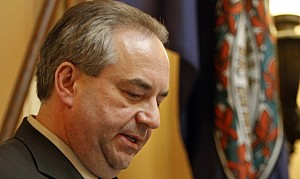Proposed ethics commission grows ‘teeth,’ but potential for ethical gaps remains

Then-Lt. Gov. Bill Bolling during a Virginia Senate debate. He now co-chairs a governor-appointed commission on state integrity.
By Kathryn Watson | Watchdog.org, Virginia Bureau
RICHMOND, Va. — Virginia is one step closer to having an independent ethics review commission, the lack of which has led to failing grades on national report cards.
The Governor’s Commission on Integrity and Public Confidence in State Government decided Friday to recommend an independent ethics commission, with authority to launch investigations into potential violations. Members, appointed by Gov. Terry McAuliffe, urged that such a commission should have the ability to impose fines for civil violations and refer criminal cases to law enforcement.
How the second commission would be structured and who will serve hasn’t been decided.
McAuliffe’s team will draft legislation based on the recommendations from the governor-appointed commission by Dec. 1. The General Assembly will take up a vote in the 2015 legislative session.
Commission co-chair and former Republican Lt. Gov. Bill Bolling emphasized that creating an ethics review commission “that really has teeth” is a “huge step forward.”
Still, not everything the commission recommends to the governor for draft legislation is sure to tighten Virginia’s conflict-of-interest and disclosure laws.
The governor’s commission decided to recommend upping the threshold for reporting gifts, from $50 to $100, something commission co-chair and former Democratic U.S. Rep. Rick Boucher said is largely needed because the value of money and the economy has changed since the $50 threshold was imposed.
Members also decided it’s too strict to require reporting conflicts of interest related to “family members,” and decided to narrow that disclosure requirement to “immediate family members.”
The commission decided the proposed independent ethics commission should review any work-related travel reimbursement from a third party above $250.
One member’s proposal that any request not approved within a 10-day window be automatically improved was shot down.
Bolling told reporters he is confident the governor-appointed commission will only further accountability, not lessen it.
“I don’t think there is anything that this commission is going to do that will decrease public confidence at all,” Bolling said. “I think everything that we’ve done should really serve to help increase public confidence that we’re serious about making substantive recommendations on how we can address some of the obvious deficiencies in our current ethics laws that exist today.”
The commission is recommending capping intangible gifts from a donor — things like conferences and travel — at $250, in addition to banning tangible gifts at $250.
It chose to stick with a one-year revolving door ban — public officeholders who leave their posts have to wait one year before lobbying the state. Common Cause, a nonprofit, liberal-leaning group that advocates for transparent government, has pushed a two-year ban.
“If you enter this arena, if you take on the mantel of public trust, as an elected official, there are benefits from that,” Bolling said. “But you also give up some things. … You know, you’re subject to a higher level of scrutiny and oversight. And that can be a pain in the butt. I mean, there were times when it was certainly a pain in my butt. But you give that up. And if you’re not willing to give that up, then do something else.”
Kathryn Watson is an investigative reporter for Watchdog.org’s Virginia Bureau, and can be found on Twitter @kathrynw5.







